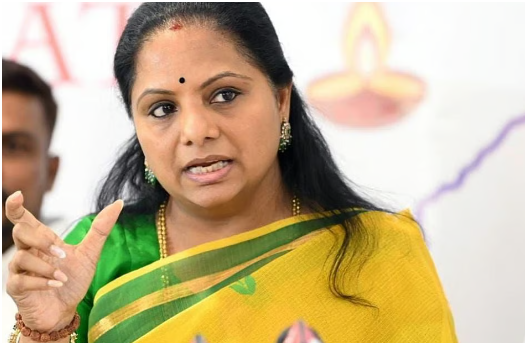BRS Leader K Kavitha Denied Interim Bail in Delhi’s Excise Policy Case, Power Struggle
BRS Leader K Kavitha Denied Interim Bail in Delhi’s Excise Policy Case
In a recent development, Special Judge Kaveri Baweja of a Delhi Court dismissed Bharat Rashtra Samithi (BRS) BRS Leader K Kavitha’s plea for interim bail in connection with a money laundering case linked to the now-defunct Delhi liquor excise policy. The court’s decision came on Monday, following Kavitha’s application citing her 16-year-old son’s exams and a provision in the anti-money laundering law that favors the release of female accused on bail.
During the hearing on April 4, BRS Leader argued for bail under the proviso to Section 45 of the Prevention of Money Laundering (PMLA) Act, which allows for the release of female accused on bail under certain circumstances. She emphasized the need for her presence to support her son during his exams, highlighting the emotional support that only a mother can provide during such a critical time.

However, the Enforcement Directorate (ED) opposed Kavitha’s bail plea, contending that the exception for women under the proviso to Section 45 of the PMLA Act is intended for individuals who lack agency, unlike BRS Leader , who is a prominent politician. The ED alleged Kavitha’s involvement in bribery and benefiting through proxies, based on documents and WhatsApp chats. The agency also claimed that Kavitha had destroyed evidence, including data on her mobile phone, as indicated by forensic reports.
Moreover, the ED pointed out that BRS Leader K Kavitha son’s exams were already underway, with a majority of papers already completed, and that the teenager had family members to support him. Kavitha’s regular bail application is scheduled for arguments on April 20.
Kavitha was arrested by the ED on March 15 in connection with the Delhi excise policy case and has been in judicial custody at Tihar Jail since March 26. While she has not been formally charged in any of the six ED charge sheets filed thus far, she has been referenced as a significant figure in court documents.
The primary allegation against BRS Leader K Kavitha revolves around her alleged involvement in a bribery scheme known as the “South Group,” which purportedly paid kickbacks worth ₹100 crore to Aam Aadmi Party (AAP) leaders in exchange for preferential treatment in securing retail zones under the Delhi excise policy. Additionally, Kavitha is under scrutiny by the Central Bureau of Investigation (CBI), which issued a summons to her last month in connection with the case. Despite the summons, Kavitha did not appear before the CBI, citing an exemption granted by the Supreme Court.
Last week, the CBI obtained permission from the court to interrogate BRS Leader K Kavitha during her judicial custody. Kavitha has also approached the court opposing the order, seeking to keep it in abeyance until she is heard.
As the legal battle unfolds, the case underscores broader issues surrounding corruption and malfeasance within the political sphere. It serves as a stark reminder of the importance of upholding integrity and accountability in public service, and the consequences of betraying the trust placed by the electorate.
Moreover, the outcome of BRS Leader K Kavitha’s legal proceedings could have far-reaching implications for the political landscape, shaping public perception and influencing electoral dynamics. The scrutiny surrounding her actions highlights the need for greater transparency and ethical governance in the political arena.
BRS Leader K Kavitha’s denial of interim bail in the money laundering case linked to the Delhi excise policy underscores the complexities and challenges inherent in navigating the intersection of politics and law. As the legal process unfolds, it remains imperative to uphold principles of justice, accountability, and transparency, ensuring that those entrusted with public office are held to the highest standards of integrity and ethical conduct.
The accusations of bribery and misconduct have cast a shadow over her political career, raising questions about ethical conduct and accountability in public office.
For the latest updates-click here.
